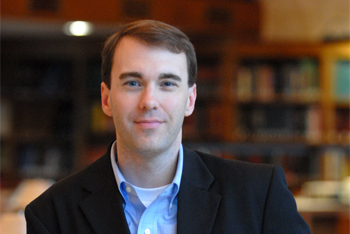Editor’s note: As the Christian landscape changes, leaders must ask and answer a new question: What’s the future of denominations? This interview is part of an occasional series that offers insight on this vital issue. To see the entire series, click here.
Denominations may not think they have enough to keep doing what they’ve done in the past, but they could have more than enough for what God calls them to do now, said Gil Rendle, a noted church consultant.
“The possibility is that we have enough or more than enough to do what God calls us to do next,” Rendle said. “It’s only if we trap ourselves into saying that we have to continue what we have that we run into this pessimistic kind of a moment.”
Rendle is a senior consultant with the Texas Methodist Foundation and an independent consultant working with issues of change and leadership in denominations and large churches. Previously, he was an author, seminar leader and senior consultant for the Alban Institute for 12 years. An ordained United Methodist minister, Gil served as senior pastor of two urban congregations in Pennsylvania for 16 years and as a denominational consultant for the United Methodist Church for nine years. He has a Ph.D. in organizational development from Temple University and a Th.M. from Boston University.
Rendle spoke with Faith & Leadership about the future of denominations. The video clip is an excerpt from the following edited transcript.
Q: What is the biggest challenge for denominations and their leaders?
One is being able to clarify their identity and their purpose. In our United Methodist Church, who are we as United Methodist people? What is it we believe, and what are we committed to do?
Along with that, people are reinventing the covenant relationship with the denomination. How and why should a congregation relate to a denomination?
Q: Could you talk about the changing relationships between denominations and larger congregations?
If you think about the denomination as a service provider, our largest congregations have very little need for the services of the denomination. Denominations are still trying to provide resources to help people do church, when our largest congregations are asking questions about how do you do mission or how do you do ministry?
The denomination still is trying to be a service provider. We want to give you resources. We want to give you programs. And that’s not really necessary with the large church. They can provide that for themselves.
The large church shares a purpose with a denomination, and so how can they begin to partner on that? There are places where the largest of our churches are stepping in to do either what the denomination can’t or to contribute to what the denomination does. It’s no longer a subordinate relationship; it’s much more equal.
You’ve got younger congregations, particularly small ones, that want the connection; quite often what they want is a connection to the theology of the denomination, but they don’t want the constraints. In other words, one way of saying that is, “I don’t want to get too close.” They want the theology, and they want to be held accountable that there is a larger ministry beyond themselves.
You’ve got part of the church that is beginning to be equal with our denominational offices. You have others that want to be connected but not tied in. We’re at a point where denominations want more of a connection from congregations than the congregation often wants from the denomination.
Q: You have written that middle judicatories have an opportunity to leverage points of change. What does that mean and how might it happen?
Culturally, we’re at a time where change comes from the bottom up. And so the cultural change was first encountered by our congregations. As they began to go through their change, they pushed the change up.
At the moment, the change lives most directly at the middle judicatory level, with our annual conferences and our synods and dioceses. National church is starting to get uncomfortable with the change, and that change will eventually work its way up as well. The middle judicatory now has to ask new questions about itself, and they have much to do with mission, ministry and purpose. What is an annual conference? What should we expect an annual conference to do?
In terms of how the annual conference responds, they have a number of different leverage points. One is by shaping the story, by helping people to remember who we are as a people, not to remember what God called us to do at one time but what does God call us to do now, and then begin to direct resources toward that purpose -- clergy deployment, financial resources, lay leadership resources. Being able to reshape purpose and align resources to it is a huge piece of the leverage that you get at that middle level.
Q: Do you see opportunities for denominations and their leaders in the changing landscape, or do you see it as a story of decline?
There are some people that want to say that our clergy are clearly in crisis, and there are other people who look at the same data and say that our clergy are really in a developmental mode, and that they’re clarifying themselves.
Is this a crisis or is this an opportunity? And so, if you will, that’s an issue that has as much to do with our spirit as it does with kind of the mechanics of an institution. So clearly, I’m at a point where I think the opportunity far outweighs the crisis. Now a couple of caveats here: you don’t want to minimize the crisis, because if people don’t have some sense of urgency, the change won’t happen. And so, if you will, we actually do want people to be uncomfortable right now. We want them to be uncomfortable with their present situation and acknowledge the fact that God calls them to be more than they are, that God calls them to be bolder than they currently are. One of the things I know about congregations is that they routinely tell very weak and safe stories about themselves, because if you tell kind of a weak, safe story about yourself, you don’t have to perform a whole lot. But if you tell a bold story about yourself, you have to risk. And so we’ve got a lot of congregations that have learned how to tell very weak stories.
Q: Are you an optimist or a pessimist about changes the denominations face?
I’m an optimist. The future and the possibility are still strong. A lot of the anxiety at the moment is driven by resources. Do we have enough money? Do we have enough people?
The bottom line is that we don’t have enough to keep doing what we’ve been doing, but the possibility is that we have enough or more than enough to do what God calls us to do next. It’s only if we trap ourselves into saying that we have to continue what we have that we run into this pessimistic kind of a moment.
I’m captured by Lynne Twist, her work on money out of a book called “The Soul of Money,” where she talks about scarcity, abundance and sufficiency. Scarcity is feeling like we don’t have enough, and she points out that in the North American culture, we live in this culture of scarcity. Often we find ourselves saying, “I didn’t get enough sleep last night” or “I don’t have enough time to do what I want to do.” We’re sitting in the middle of abundance, but we evaluate everything by measuring what we don’t have.
What does it mean to live out of a culture of sufficiency? If you think about the future of the denomination, what if we have resources sufficient for what we’re called to do? I’m forever having conversations about how we don’t have enough people and we don’t have enough money to manage the churches and the buildings and so forth. It’s hard to ask people to re‑ask the question -- What if we have too much?
What if we have too many buildings? What if we have too many congregations in that area? What if we redeployed our resources for mission? My colleagues want to always remind me not to undersell the crisis. Will our denominations come out looking exactly how we would have them? No, no, they’re going to be reshaped; they’re going to be re-formed.
Q: When you speak about change presenting opportunities or making people nervous, what specific changes are you talking about?
There are some changes that are so fundamental that they rest at the center of all the other things that we have to do.
In the United Methodist Church there is a pragmatic change. Our mission at one time was to make members. We have now changed to say that our mission is to make disciples. That’s a pragmatic shift; if the end product of our ministry is to make members, then the output of what we’re trying to do here is to make sure that we have satisfied clergy and satisfied congregations, because that’s where members end up. So we want happy churches, with happy clergy, with happy members.
If you’re no longer making members, but if you’re making disciples, you’re trying to make changed persons who will change the world; then the mission of the United Methodist Church is to make disciples of Jesus Christ for the transformation of the world.
We’re no longer trying to make people happy. Now we’re trying to make people changed. Given that the output of the earlier model of making decisions was happy churches, happy clergy and more members -- well, clergy and churches are no longer the output. They’re now the input. They’re now the resources we use to make changed people.
This is a really difficult moment because so many of our congregations and our clergy have been nurtured in the idea that they are the center of attention of the denomination, because the denomination wants to make them happy. Suddenly, we’re now in a place where the question isn’t whether or not they’re being made happy; the question is, are they being deployed appropriately to be used as a tool to get to this other goal of making disciples? That’s a substantive shift. That requires a shift in our identity.
That leads me to think about myself as an expendable resource. No longer am I going to be cared for. Now I’m going to be used. Well, that’s changing the rules halfway through, and for a lot of people, this is a huge challenge. There will be many people -- whether we’re talking about clergy or lay -- who will simply have this deep sense of “That’s not what I signed up for.” There are some changes that are so fundamental that they drive much of the rest of what we’re looking at.
Q: Why does change seem to be so frightening?
Whenever we go into change there’s an experience of loss, and that’s even if the change is prompted by something that’s terribly happy. A young couple bringing a baby home from the hospital -- that’s a change in their lives. They are very happy about it. But within two weeks, they have to face the loss of sleep, the loss of intimacy, the loss of private time.
This scenario that I painted about moving clergy or congregations from being the object of attention of the denomination to kind of an expendable resource -- there’s a huge loss there. What if my needs of security aren’t met? What if I lose my place on the clergy ladder? What if my congregation is not productive enough to get the kind of clergy leadership that we need? What if they disband some of the committees and I was a chairman of that committee? Where do I go now? It’s this deep sense of loss that people intuit.
Q: Could dealing with the sense of loss shift the view of this change, or is there something real to be afraid of?
Of course there are some real things to lose. There are a number of our congregations that are not going to make the change. They won’t be able to do that. There is a natural loss there, that we know that congregation is going to go through its last stage of life. There are many conversations we can have about whether or not they’re going to leave a legacy of purpose or ministry to somebody else, but what they’re not going to do is get younger people to come in and do church like they like to do it.
Is there a real loss? You betcha. Is there a real loss for some of our clergy who are of an age that they don’t or even can’t retool? Sure. Where we lose the capacity to subsidize or to support some ministries, those are all real losses along the way, but those are tangential to that central change that we’re talking about. It’s not going to be an easy trip, but the wilderness never is. You know?









